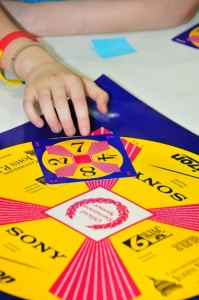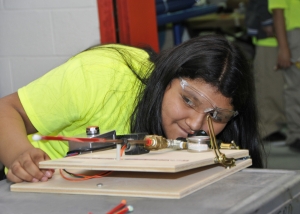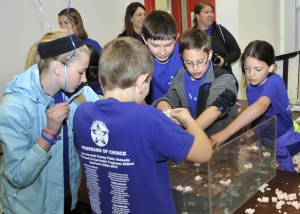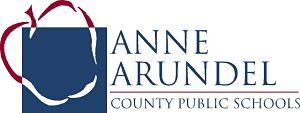What is an Advanced Co-Curricular Program?

24-Game is a co-curricular club and competition that engages 3rd, 4th, and 5th grade students around the county.
Before school at Lakes Shore Elementary, a group of students sit around a card displaying four numbers: 11-7-8-14. One student puts out her hand and taps the card: “21+3=24,” she says, “11 minus 8 equals 3 and 7 plus 14 equals 21; 21 plus 3 equals 24.” The students, a mix of 4th and 5th graders are playing 24-Game, which asks students to add, subtract, multiply, and/or divide four numbers to get 24. One of the dozens of co-curricular programs offered in AACPS, 24-Game gives students the chance to practice their math skills while hanging out with their friends—the best of both words for the students in this class: “I like a good challenge,” says one student, “and I like to laugh with my friends.”
This is exactly the type of engagement that the Office of Advanced Co-Curricular Studies hopes for when supporting their programs across the county. Co-curricular programs are an important part of Anne Arundel County Public Schools (AACPS)’s five-year strategic plan because they offer students and their family choice in their education. But what is a co-curricular program? What does that term mean and how do these programs support our students?
Co-curricular programs are opportunities designed to complement the curriculum and provide a direct link to what students are learning in the classroom. These programs, which may meet before, during, or after school, give students the chance to explore an interest in a specific subject or topic. Designed to engage a wide range of students, the county offers dozens of opportunities that range from Science, Technology, Engineering, and Math (STEM) to the humanities.
From SeaPerch Underwater Robotics to Model UN, co-curricular programs are designed to offer something for everyone—and it’s working. As of 2016, almost every school in the county offered at least one program (many offer several) and over 10,000 students are participating in at least one program.
What Types of Co-Curricular Programs are Available?
There are three types of Advanced Co-Curricular Programs in Anne Arundel County: clubs, Adjunct Programs, and competitions.
 Clubs are activities focused on a specific topic that are offered through each school for students and/or families with a special interest. While all school clubs, including those such as Yearbook and School Newspaper, give students a chance to pursue a specific interest and work with their peers, co-curricular clubs directly relate to the curriculum in some way. The Office of Advanced Studies & Programs currently supports 18 different programs including NASA Best Club—Aerospace Engineering, Integrated Fine Arts Clubs, SeaPerch Underwater Robotics, and Stock Market Game, just to name a few. Most clubs meet in person, but some meet on-line. Whether building a robot or mastering Arabic, students engaged in co-curricular clubs have the opportunity to dive into a topic that interests them.
Clubs are activities focused on a specific topic that are offered through each school for students and/or families with a special interest. While all school clubs, including those such as Yearbook and School Newspaper, give students a chance to pursue a specific interest and work with their peers, co-curricular clubs directly relate to the curriculum in some way. The Office of Advanced Studies & Programs currently supports 18 different programs including NASA Best Club—Aerospace Engineering, Integrated Fine Arts Clubs, SeaPerch Underwater Robotics, and Stock Market Game, just to name a few. Most clubs meet in person, but some meet on-line. Whether building a robot or mastering Arabic, students engaged in co-curricular clubs have the opportunity to dive into a topic that interests them.
Adjunct Programs are activities offered outside of the school day by partners in the community. Like clubs, these programs offer students the chance to pursue and develop their interest but with the added opportunity of bringing students into the community. Whether the program is offered at the United States Naval Academy or the Maryland Hall for the Creative Arts, adjunct programs expose students to professionals within the field they are studying. Currently, AACPS works with the Anne Arundel Community College, Maryland Summer Centers, St. John’s College, Maryland Hall, and United States Naval Academy to offer a wide range of adjunct programs to students throughout the calendar year.
Finally, competitions allow students to compete in academic challenges at the local, state, and national levels. Often, these competitions are held in conjunction with a club—such as a 24-Game or SeaPerch Underwater Robotics—where students develop skills and/or a project in their co-curricular club, and then compete with students across the county, state, or nation. Others, such as History Day or the Spelling Bee, are woven into the curriculum. Especially in a community that places a large emphasis on sports, competitions provide a way to celebrate students competing in academic challenges. Each year, close to 1,500 elementary, middle, and high school students participate in competitions focused on everything from English to STEM and Social Studies to World Language.
Why are Co-Curricular Programs Important?
 Quite simply, co-curricular programs provide all students with a place to shine. When students are interested in a topic they are more likely to succeed and with dozens of program across an incredibly wide range of topics, co-curricular programs give students a place to pursue their interests. In an environment where teachers serve more as mentors than class leaders, students who may seem shy or unsure in the classroom can shine in a new light.
Quite simply, co-curricular programs provide all students with a place to shine. When students are interested in a topic they are more likely to succeed and with dozens of program across an incredibly wide range of topics, co-curricular programs give students a place to pursue their interests. In an environment where teachers serve more as mentors than class leaders, students who may seem shy or unsure in the classroom can shine in a new light.
This is a benefit of co-curricular programs that Betty Elder, Teacher Specialist for Advanced Co-Curricular Programs, knows well. “Children bring so much to the game,” she says. When she sees students participate in a co-curricular program, “All of a sudden they are problem solvers that can do something different…all of a sudden they are saying, I can speak Spanish or I can Speak French, or I’ve done this project or boy I can build this underwater robot! They bring their parents [and teachers] in and show them I can do this or I’m a new leader.” Whether through a club, adjunct program, or competition, co-curricular programs allow students to grow in a way that is not always possible in the traditional classroom.
But most importantly, Co-curricular Programs give students a choice in their education. AACPS serves tens of thousands of students, each of whom brings unique interests and skills to the table. By offering co-curricular programs at every grade level across a wide variety of topics, we can give every child the power to pursue their own passion.
And this is exactly what Betty Elder works so hard to provide. “When I was going through school I was always told that girls can’t do this or you need to do this set of classes, science is not for you. [Now], here is an opportunity for everyone to do what they want to do,” Ms. Elder says, “We’re opening the doors and letting everyone be challenged in any way they want to be.”

